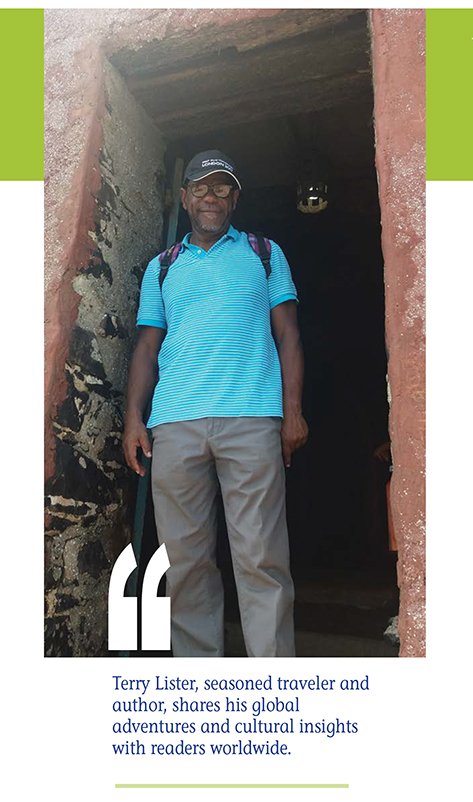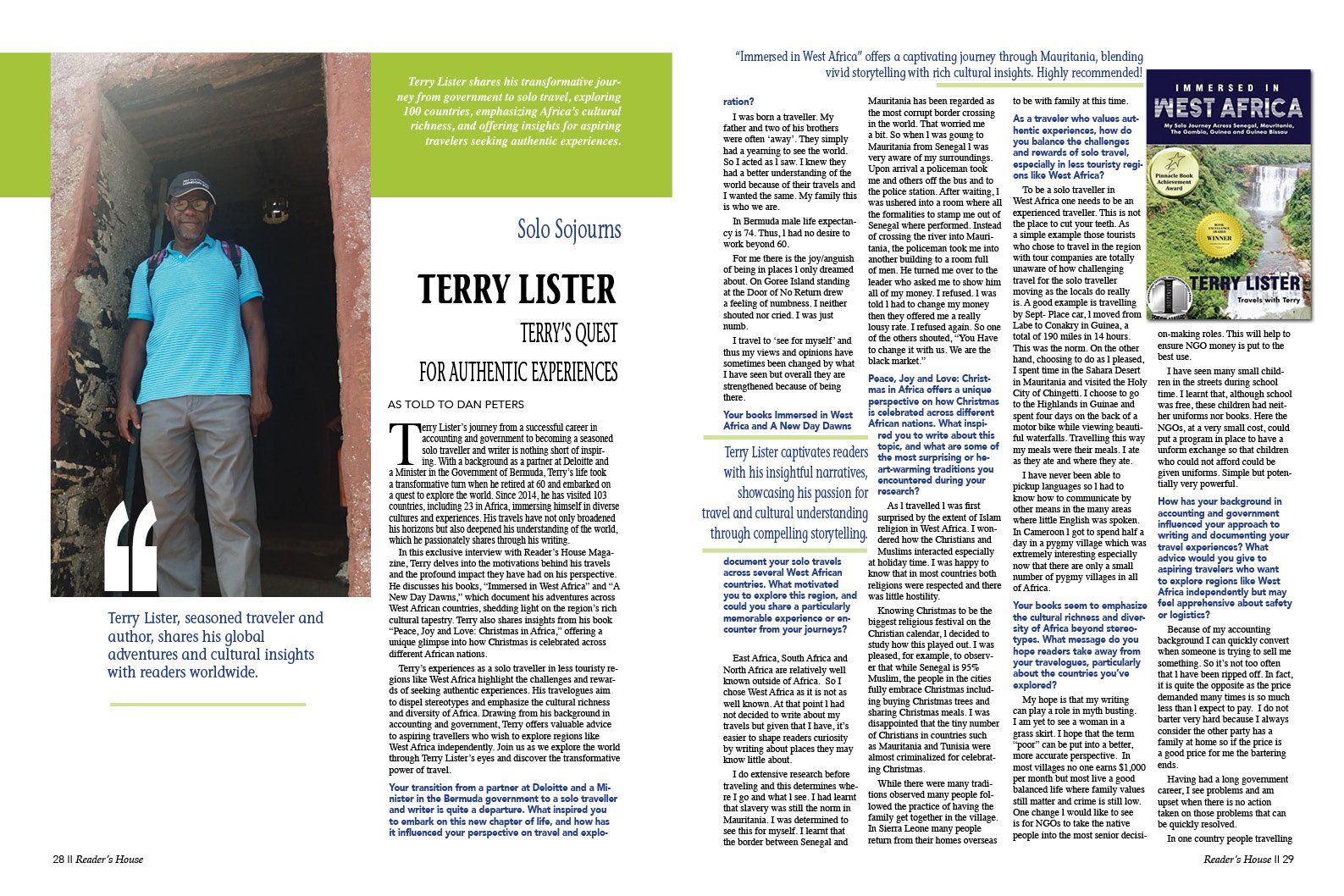Terry’s Quest for Authentic Experiences
Terry Lister shares his transformative journey from government to solo travel, exploring 100 countries, emphasizing Africa’s cultural richness, and offering insights for aspiring travelers seeking authentic experiences.
Terry Lister’s journey from a successful career in accounting and government to becoming a seasoned solo traveller and writer is nothing short of inspiring. With a background as a partner at Deloitte and a Minister in the Government of Bermuda, Terry’s life took a transformative turn when he retired at 60 and embarked on a quest to explore the world. Since 2014, he has visited 103 countries, including 23 in Africa, immersing himself in diverse cultures and experiences. His travels have not only broadened his horizons but also deepened his understanding of the world, which he passionately shares through his writing.
In this exclusive interview with Reader’s House Magazine, Terry delves into the motivations behind his travels and the profound impact they have had on his perspective. He discusses his books, “Immersed in West Africa” and “A New Day Dawns,” which document his adventures across West African countries, shedding light on the region’s rich cultural tapestry. Terry also shares insights from his book “Peace, Joy and Love: Christmas in Africa,” offering a unique glimpse into how Christmas is celebrated across different African nations.
Terry’s experiences as a solo traveller in less touristy regions like West Africa highlight the challenges and rewards of seeking authentic experiences. His travelogues aim to dispel stereotypes and emphasize the cultural richness and diversity of Africa. Drawing from his background in accounting and government, Terry offers valuable advice to aspiring travellers who wish to explore regions like West Africa independently. Join us as we explore the world through Terry Lister’s eyes and discover the transformative power of travel.

Your transition from a partner at Deloitte and a Minister in the Bermuda government to a solo traveller and writer is quite a departure. What inspired you to embark on this new chapter of life, and how has it influenced your perspective on travel and exploration?
I was born a traveller. My father and two of his brothers were often ‘away’. They simply had a yearning to see the world. So I acted as l saw. I knew they had a better understanding of the world because of their travels and I wanted the same. My family this is who we are.
In Bermuda male life expectancy is 74. Thus, l had no desire to work beyond 60.
For me there is the joy/anguish of being in places l only dreamed about. On Goree Island standing at the Door of No Return drew a feeling of numbness. I neither shouted nor cried. I was just numb.
I travel to ‘see for myself’ and thus my views and opinions have sometimes been changed by what I have seen but overall they are strengthened because of being there.
Your books Immersed in West Africa and A New Day Dawns document your solo travels across several West African countries. What motivated you to explore this region, and could you share a particularly memorable experience or encounter from your journeys?
East Africa, South Africa and North Africa are relatively well known outside of Africa. So I chose West Africa as it is not as well known. At that point l had not decided to write about my travels but given that I have, it’s easier to shape readers curiosity by writing about places they may know little about.
I do extensive research before traveling and this determines where I go and what l see. I had learnt that slavery was still the norm in Mauritania. I was determined to see this for myself. I learnt that the border between Senegal and Mauritania has been regarded as the most corrupt border crossing in the world. That worried me a bit. So when l was goung to Mauritania from Senegal l was very aware of my surroundings. Upon arrival a policeman took me and others off the bus and to the police station. After waiting, l was ushered into a room where all the formalities to stamp me out of Senegal where performed. Instead of crossing the river into Mauritania, the policeman took me into another building to a room full of men. He turned me over to the leader who asked me to show him all of my money. I refused. l was told l had to change my money then they offered me a really lousy rate. I refused again. So one of the others shouted, “You Have to change it with us. We are the black market.”
Peace, Joy and Love: Christmas in Africa offers a unique perspective on how Christmas is celebrated across different African nations. What inspired you to write about this topic, and what are some of the most surprising or heart-warming traditions you encountered during your research?
As l travelled l was first surprised by the extent of Islam religion in West Africa. I wondered how the Christians and Muslims interacted especially at holiday time. I was happy to know that in most countries both religions were respected and there was little hostility.
Knowing Christmas to be the biggest religious festival on the Christian calendar, l decided to study how this played out. I was pleased, for example, to observer that while Senegal is 95% Muslim, the people in the cities fully embrace Christmas including buying Christmas trees and sharing Christmas meals. I was disappointed that the tiny number of Christians in countries such as Mauritania and Tunisia were almost criminalized for celebrating Christmas.
While there were many traditions observed many people followed the practice of having the family get together in the village. In Sierra Leone many people return from their homes overseas to be with family at this time.
As a traveler who values authentic experiences, how do you balance the challenges and rewards of solo travel, especially in less touristy regions like West Africa?
To be a solo traveller in West Africa one needs to be an experienced traveller. This is not the place to cut your teeth. As a simple example those tourists who chose to travel in the region with tour companies are totally unaware of how challenging travel for the solo traveller moving as the locals do really is. A good example is travelling by Sept- Place car, l moved from Labe to Conakry in Guinea, a total of 190 miles in 14 hours. This was the norm. On the other hand, choosing to do as l pleased, I spent time in the Sahara Desert in Mauritania and visited the Holy City of Chingetti. I choose to go to the Highlands in Guinae and spent four days on the back of a motor bike while viewing beautiful waterfalls. Travelling this way my meals were their meals. I ate as they ate and where they ate.
I have never been able to pickup languages so l had to know how to communicate by other means in the many areas where little English was spoken. In Cameroon l got to spend half a day in a pygmy village which was extremely interesting especially now that there are only a small number of pygmy villages in all of Africa.
Your books seem to emphasize the cultural richness and diversity of Africa beyond stereotypes. What message do you hope readers take away from your travelogues, particularly about the countries you’ve explored?
My hope is that my writing can play a role in myth busting. I am yet to see a woman in a grass skirt. I hope that the term “poor” can be put into a better, more accurate perspective. In most villages no one earns $1,000 per month but most live a good balanced life where family values still matter and crime is still low. One change l would like to see is for NGOs to take the native people into the most senior decision-making roles. This will help to ensure NGO money is put to the best use.
I have seen many small children in the streets during school time. I learnt that, although school was free, these children had neither uniforms nor books. Here the NGOs, at a very small cost, could put a program in place to have a unform exchange so that children who could not afford could be given uniforms. Simple but potentially very powerful.
How has your background in accounting and government influenced your approach to writing and documenting your travel experiences? What advice would you give to aspiring travelers who want to explore regions like West Africa independently but may feel apprehensive about safety or logistics?
Because of my accounting background I can quickly convert when someone is trying to sell me something. So it’s not too often that l have been ripped off. In fact, it is quite the opposite as the price demanded many times is so much less than l expect to pay. I do not barter very hard because I always consider the other party has a family at home so if the price is a good price for me the bartering ends.
Having had a long government career, I see problems and am upset when there is no action taken on those problems that can be quickly resolved.
In one country people travelling from city to city must show their ID but many times this has been damaged and so much hassle ensues at the stop points including on the spot fines. Sometimes the holder of the ID has been trying to have it replaced for one or more years. To me this is unacceptable.
I would encourage experienced, confident travellers to go solo in West Africa but this is not the place for the inexperienced. Thanks to sound research, l did not feel safety was an issue but logistics can be a nightmare if you do not know how to deal with them.
Follow the auhtor;
- Amazon: ttps://www.amazon.com/author/terrylister
- Goodreads: https://www.goodreads.com/author/show/TerryLister



